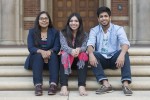Nijum Pratik and her family came to the U.S. from Bangladesh in 2010, but she struggled to find a place at UCLA to discuss the war and regional conflict that had impacted her homeland.
She and her friends said they thought many of the existing Asian cultural clubs were too broad and did not focus attention on Bengali history and culture.
“We thought it would be best to have a safe place where people could talk about what’s going on and educate others,” said Pratik, a fourth-year psychobiology student. “Many Bengali students were born here and want to celebrate culture, but (also) talk about issues that really affect the country.”
In November, Pratik and other students who speak the Bangla language connected on campus by forming the Bengali Students Association. The club aims to provide a space for Bengali students to connect with their heritage, especially students who were born in the U.S. and want to know more about their culture.
The club members discuss issues like the Bangladesh Genocide, which occurred during the Liberation War between East and West Pakistan in 1971. Club founder Rasha Howlader, a fifth-year electrical engineering student, said students who lost family members to the war often have a difficult time finding a place to learn about what happened and express their feelings, because it can be too sensitive to discuss at home.
“All I have is my grandmother, but it’s such a difficult story to tell, so I don’t feel comfortable asking her,” Howlader said.
The club accepts members regardless of their nation of origin because native Bangla speakers traditionally come from India as well as Bangladesh. There are 60 members in the club, 40 of which are Bengali students.
“It’s not just open to Bengali students; this organization is open to anyone who is willing to learn,” Pratik said.
Bengali Students Association leaders said they hope to hold at least three events per quarter, but are going to be limited by their budget as a new club. They emphasize education about Bangladeshi history through movie screenings as well as group discussions.
“Our language is what makes us different, so we want to feature Bengali music and Bengali poetry, not fluffy events, to help us find ourselves and find our identity,” Howlader said.
An event the club will celebrate to embrace their culture is Ekushey, a day of observance on Feb. 21 that commemorates the lives of several University of Dhaka students who were killed in 1952. The students were killed during the conflict over what should be the national language of what is now known as Bangladesh, Howlader said.
Many Bengali residents at the time wanted Bangla to be the national language of the country because a majority of the people spoke it, but Pakistanis wanted to transition to Urdu. Eventually, East Pakistan became Bangladesh after the Liberation War, and the people there adopted Bangla as their official tongue, Howlader added. She said she thinks the language of Bangladesh is a key aspect of Bengali identity because it distinguishes Bangladeshis from Pakistanis, who previously controlled that land.
“It’s important because as students, they made a great impact in making Bangla the national language,” Howlader said.
The members of the Bengali Students Association are working to create archives that will document the history of Bangladesh through the experiences of friends and relatives who experienced these conflicts firsthand. They said they hope to finish by April.
“I started this (club) because I’m still learning about my cultural identity, and I wanted to learn from other peers,” Howlader said. “In my household, my family just wanted us to get an education and move forward, so they never really talked about it, but as a Bengali, it is my duty to learn more.”
